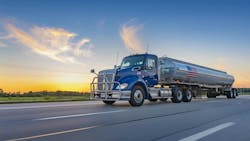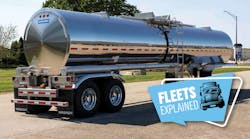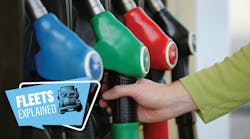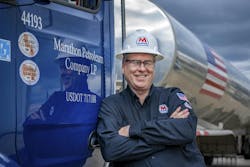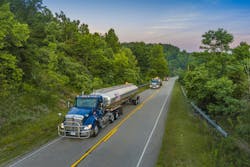Key takeaways:
- Marathon Petroleum's private fleet is an industry leader in driver retention, helping it ensure reliable fuel delivery.
- With more than 500 trucks, Marathon Petroleum's private fleet plays a crucial role in distributing energy supply across the nation.
- A strong safety-focused culture is a driving force behind Marathon Petroleum's fleet success and among the reasons it was awarded the FleetOwner 500 Private Fleet of the Year award.
Powered by safety, innovation, and empowered drivers, Marathon Petroleum Corporation’s private fleet is fueling the future.
The coast-to-coast tanker operation moves gasoline, diesel, crude, and renewable fuels for the integrated downstream energy company with the nation’s largest refining system.
Marathon Petroleum's private fleet has more than 500 tractors and trailers. The company, which includes a separate field maintenance and storage operation, ranks No. 211 on the 2025 FleetOwner: Private list of the U.S.’s largest private transportation operations. The operation was the largest of three private fleets honored with FleetOwner 500 Private Fleet of the Year awards during the National Private Truck Council conference in Orlando this May. The awards are sponsored by Descartes.
Marathon Petroleum transportation facts and figures
Marathon Petroleum originated as the Ohio Oil Company, formed when several small oil companies merged in 1887. It was part of Standard Oil before that company was broken up. Ohio Oil’s Marathon service stations focused on customer service and was the first fuel company to offer a “metal credit plate” to drivers, a precursor of the credit card. Ohio Oil Company rebranded as Marathon Oil Company in 1962. Marathon Petroleum Corporation became a stand-alone refining, marketing, and transportation company in 2011.
FleetOwner 500 rank: 211
Private fleet size: 500+
Private fleet drivers: 1,100+
Headquarters: Findlay, Ohio
Community outreach: Various locations sent 211 volunteers to 40 volunteer events in 2024, and other supported events include Stuff the Bus, Spirit of Freedom 5K, and various charity donations to 14 organizations.
Website: DriveForMPC.com
Driver retention: 85.5%
Delivery reliability rate: 99.75%
Preventable DOT accident rate: 0.14 per million miles
Marathon’s 13 refineries can produce 3 million barrels of crude oil daily and has a growing renewable fuels portfolio. The company’s midstream energy asset network links natural gas producers from some of the nation’s largest supply basins to U.S. and international markets.
“I think there’s a lot of value and benefit with our fleet being able to help with supply disruptions and really help our customers get the supply they need when they need it,” Katie Zalat, West transport operations director, told FleetOwner during an interview with the fleet’s executive team. “I equate us to a roving pipeline. When there are pipeline disruptions or refinery disruptions, our trucks are very mobile and can go help Marathon.”
Dayna Reid, Ohio Valley transport operations area manager, said the fleet’s logistical strengths shine during natural disasters. “We also help when we have high river levels or during hurricane responses,” she said. “It’s something that they can flex pretty easily into a market to help move product in or out of a market so they can limit the supply constraints.”
Curtis Ayars, director of transport, planning, and scheduling, noted that natural disasters and other supply disruptions impact energy markets. “Having your own proprietary fleet and the control of that fleet to be able to do things that are most important to you in that moment are beneficial to the company,” he said during the interview. “So we don’t need to compete for resources that may be limited or pulled in multiple directions.”
Driving toward success
The fleet’s leaders credited its more than 1,100 company drivers and supporting maintenance team for fueling its success. “Them wanting to come to work is a big reliability piece,” Joe Ernst, transportation scheduling manager, said. “We have one of the nicest fleets out there—not only in appearance, but it’s well maintained, safe to drive.”
Those drivers move refinery feedstocks, finished refinery products, and renewable fuels via tanker trucks. The bulk fleet’s products include gasoline, diesel, ethanol, crude, jet fuel, butane, sulfur, asphalt, and waste bin hauling.
Boasting an 85.5% driver retention rate in 2024, Marathon outpaced the private fleet average of 20.2% turnover, according to the NPTC Benchmarking Report. According to Jocko Langlois, East transport operations director, drivers receive top-tier pay and substantial benefits packages.
The fleet also has a rigorous hiring, onboarding, and certification process that helps it ensure its drivers fit the operations. Once they join the team, Marathon offers robust corporate and fleet-specific recognition programs for safe driving.
While Marathon has some long-haul drivers who support product or workforce disruptions, most private fleet drivers operate in day cabs, running 12-hour, slip-seated shifts on regional routes that get them home after work.
Creating a winning culture
Langlois credits company leadership and supervisor training for the high driver satisfaction. “When we bring new field leaders into the fleet world, we run them through a training process to ensure it’s a fit for both of us,” he said. “We help them learn all the different pieces and parts of the job before they have the full leadership responsibilities.”
During that extensive training, incoming field leaders learn Marathon’s various supply processes and procedures while also being exposed to the company’s culture: “How we want them interacting with the drivers,” Langlois explained. “We want them to recognize the employees for the good things they do, and coach them when they need to improve.
“I think if you have a good set of leaders out there, that really helps the drivers want to come to work,” he added.
A lot of that leadership begins with safety, according to Jaki Frantz, Pacific transport operations area manager. “Safety is paramount in our culture,” she told FleetOwner. “If you’re a driver and your leadership takes your safety seriously—and any feedback you have about the sites you’re delivering at or mechanical issues—we ensure that we address those with priority. We talk about safety on a daily basis, and we stand behind it as well. That’s been one of my favorite things about working at Marathon—it’s not just talk. We actually embody the safety culture.”
Ayars said that all Marathon employees share a safety mission. “No matter who it is—whether it’s a dispatcher in the scheduling center or a driver who’s on the front line—we all support one another regarding safety. We are very committed to ensuring people go home the way they came to work.”
About the Author
Josh Fisher
Editor-in-Chief
Editor-in-Chief Josh Fisher has been with FleetOwner since 2017. He covers everything from modern fleet management to operational efficiency, artificial intelligence, autonomous trucking, alternative fuels and powertrains, regulations, and emerging transportation technology. Based in Maryland, he writes the Lane Shift Ahead column about the changing North American transportation landscape.
